During my first Dutch winter, I spent a lot of time missing my seasonal favourites from home instead of appreciating the Dutch delicacies in front of me. This year, I was determined to broaden my horizons and try some festive Dutch food.
To start off, I asked my Dutch friends a simple question: what was their idea of festive Dutch food?
The answers were surprisingly diverse, ranging from turkey to kerstkransjes to oliebollen and, nestled somewhere in between, the star of this post: the mysterious koek en zopie.
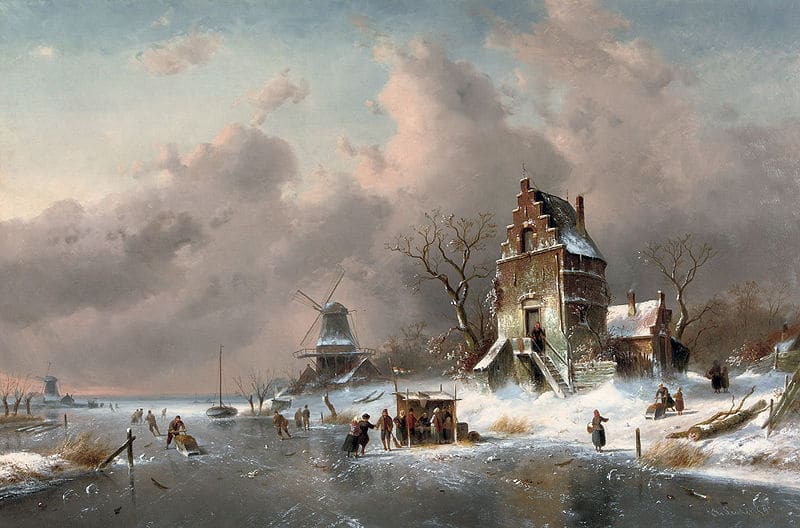
What is koek & zopie?
Koek & zopie simply refers to the combination of any warm beverage, be it Chocomel or glühwein, and a cookie — sold on the sides of frozen canals to deserving skaters.
However, if Wikipedia serves me well, the original zopie is an entirely different sort of drink that dates back to the seventeenth century and is decidedly less tasty — but I’m getting ahead of myself.
Koek & zopie: a Dutch mystery
There were two major driving forces in my decision to try my hands at the ‘original’ zopie recipe:
- First, when my boyfriend initially answered my question about festive Dutch food via WhatsApp, koek & zopie was autocorrected to koek & Sophie.
- Second, after some preliminary research, I discovered that there was next to no information available online about this mysterious concoction.
So really, not much was known about this Dutch concept. All I found was a single recipe, varying very subtly between two or three websites, each variation more vague than the one before.
There were no pictures. No descriptions of the taste or the texture or the smell. Nothing!
I knew then that I would have to change that.
READ MORE | Your guide to all the ‘lekker’ Dutch festive food and drinks you can enjoy (guilt free) this holiday season
(In keeping with the Dutch tradition, koek & zopie really ought to be enjoyed after a rigorous ice skating session. If you don’t happen to live near a skating rink, or if you’re just not big on the sport, you can always opt to simulate this part of the tradition. I did this by throwing open the bathroom window and sitting on the icy cold tiled floor. 😉)
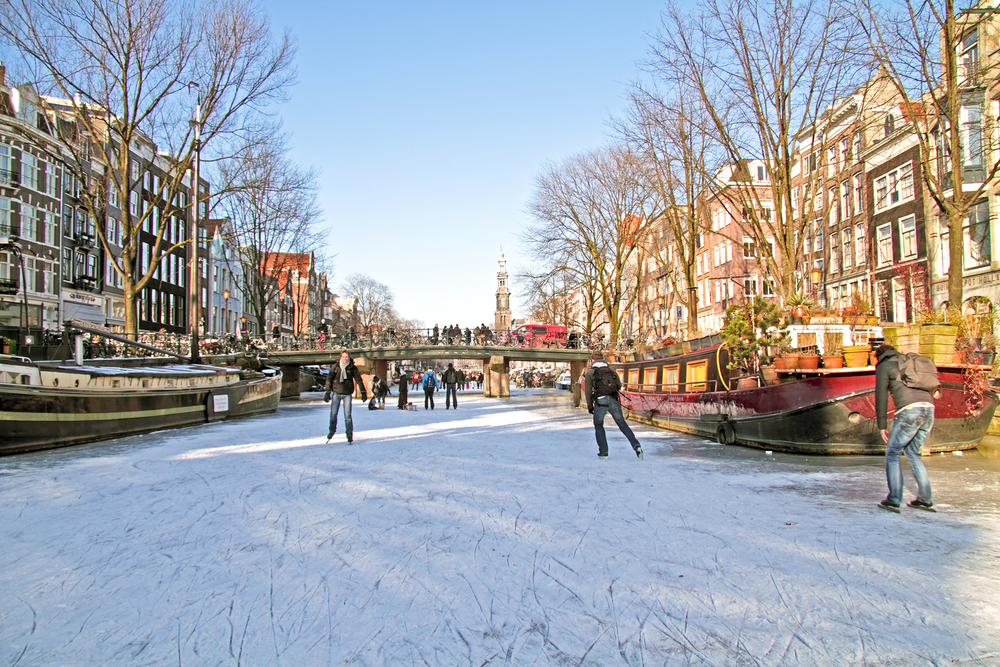
How to make authentic Dutch zopie
It was with a sense of mounting excitement that I grabbed a pen and noted down the ingredients needed to make my kook & zopie: beer, cinnamon, sugar, a lemon, cloves, and an egg.
I pushed aside any creeping doubts, so curious was I about this seventeenth-century tradition. Into a saucepan went three cans of beer, followed by the lemon, cinnamon and clove. Everything disappeared into a furiously bubbling foam. It wasn’t a very promising start.
Some ten minutes later, the apartment had acquired the distinct odour of a bar full of sweaty, enthusiastic dancers at 4 o’clock in the morning. On the other hand, the simmering concoction actually looked surprisingly nice — a bit like glühwein, in fact, only with a less appetizing smell.
READ MORE | 11 Dutch treats that you need to eat (like, right now)
All in all, it was rather encouraging. Until I thought it’d be a good idea to stir it, at which point the foam, which I’d foolishly thought had already dissipated, came back with a vengeance.
But no matter! I’d reached the most intriguing step in the entire process … the binding. Every variation of the recipe instructed me to use a mixture of egg and sugar, beaten to an undefined extent, to “bind” the beer.
What I was supposed to bind the beer into (or why I wanted to bind the beer in the first place) was not a problem that arose on any of the pages, so I simply did as I was told and, with a final nervous gulp, I poured the beaten egg and sugar mixture into the bubbling liquid.
At this point, it occurred to me that this whole thing might be an elaborate Internet prank.
There is, in fact, nothing illuminating in the binding step. You grab a wooden spoon and stir like your life depends on it, holding your breath and silently praying you don’t end up with scrambled eggs, and for what?
An ever-so-slightly paler liquid than you started out with, and no further understanding of the process.
I don’t know what I was expecting … that the beer would mix with the raw egg to form a divine eggnog-like finish? Maybe. That I would uncover a delicious albeit forgotten treasure in the realm of festive Dutch food? Admittedly … yes.
Koek & zopie: my verdict
To be fair, it wasn’t terrible (though that may be the rum talking).
I served it in big glass mugs and we drank it with bemused expressions, alternately sipping, masking the taste with a family pack of speculaas, and stirring to prevent the fine floating egg particles from settling down at the bottom, all the while reassuring ourselves that it was “actually not that bad.”
No one touched the leftovers. In the fridge, the egg separated from the beer at an alarming rate until, two days later, I had to admit defeat and flush it down the toilet. At least now I understood why the recipe was no longer in use.
Would I make it again? No. Should you try it? Yes, if only for the laughs.
Alternatively, just make some glühwein. 😉
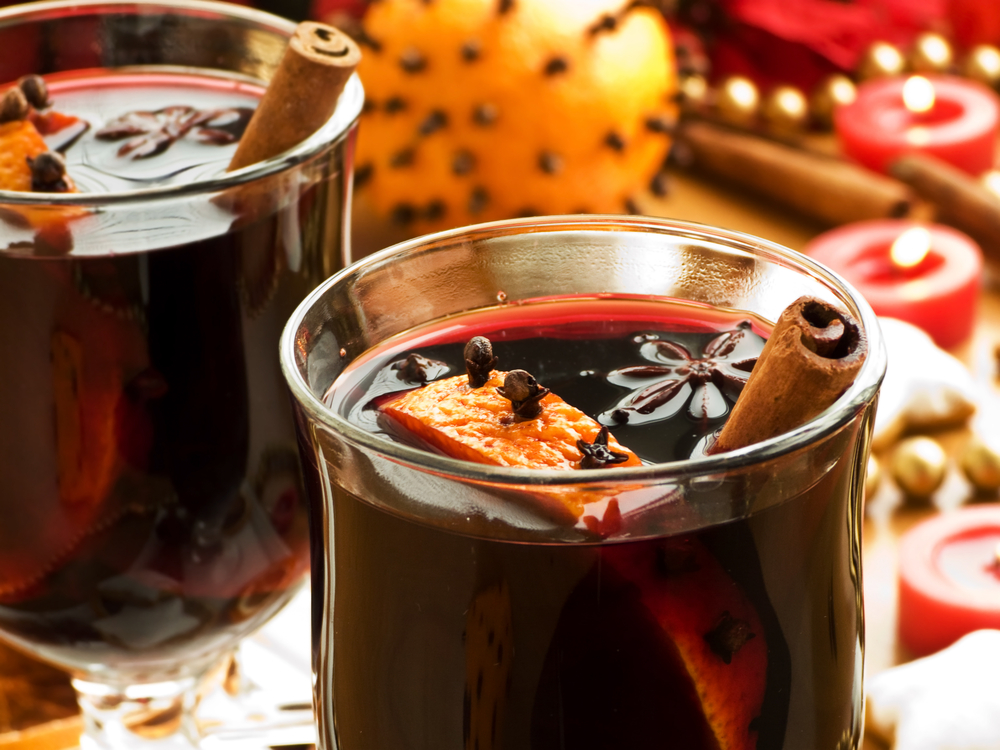
Koek & zopie: the recipe
Does that look lekker to you? Then it’s time you try for yourself. Here’s the recipe I used for my zopie:
- 3 bottles of dark beer
- 1 cinnamon stick
- 2 whole cloves
- 2 slices lemon
- 125g brown sugar
- 2 whole eggs
- liberal amounts of rum
Bring the beer to a simmer with the cinnamon, lemon and cloves. In the meantime, beat the sugar and egg together. (I won’t tell you how much because that would take away all the fun. And honestly, because I still don’t know.)
Finally, add the egg/sugar mixture to the hot beer, stirring frantically all the while. Serve immediately and top off each portion with a big splash of rum. The more rum, the better. Trust me on this one.
Last but not least: get a cookie or a piece of cake for your koek — and there you go!
Have you tried this (kind of) tasty Dutch beverage? Tell us your thoughts in the comments below!
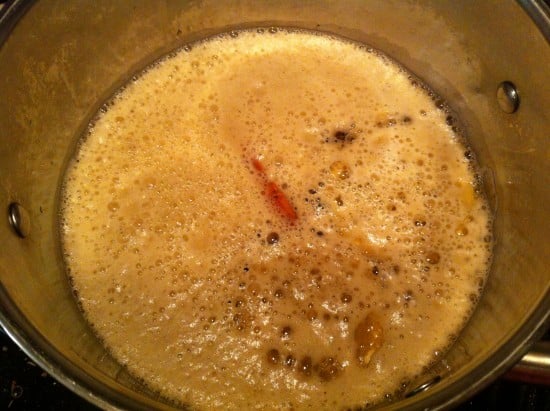
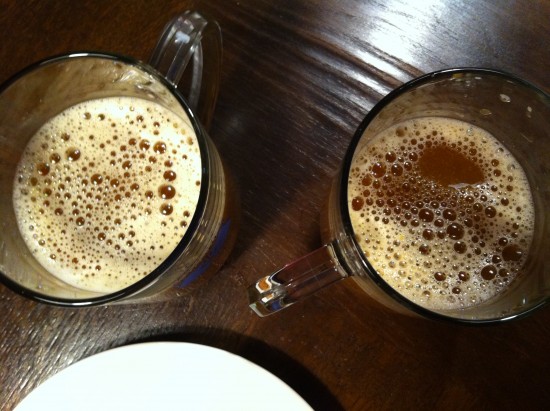

Legeren is het binden met eidooiers. Meng hiervoor een beetje vloeistof met de eidooiers en giet dit mengsel bij de saus of soep. Dit vooraf mengen wordt ‘familie maken’ genoemd.
Zorg dat de saus niet meer aan de kook raakt. Daardoor stolt het ei namelijk en krijgt u lelijke draden en stolsels in de saus. Ook gaat zo de bindkracht verloren.
http://www.sligro.nl/inspiratie/kooktechnieken/binden.htm
Thanks for this explanation Bart 🙂 Interestingly, I did in fact do as you suggest and add a bit of the hot beer to the eggs but figured it took away from the overall drama of the story so I didn’t mention it … And unfortunately it didn’t really help! Have you ever made a delicious zopie? I’m curious.
You are a brave soul!
My Dutch is not good enough to figure out what BartB suggested, but judging from your reply, it is about adding some hot beer to the eggs, to bring them to the right temperature. There is a traditional Greek recipe, avgolemono, (http://www.epicurious.com/recipes/food/views/Avgolemono-352269) that calls for the exact same thing: adding eggs to a liquid, to thicken it. I have failed about 10 times before getting it right and it required the eggs to be blended with a blender and a LOT of patience in adding in the hot liquid slowly. So if anyone wants to try zopie, copying the avgolemono instructions might help.
Thanks for this Alexis! Part of me wants to try, and the other part of me remembers how it looked two days later … haha
You tried once. You are a hero already 😀 Let someone else do it. You deserve some rest and a cup of hot chocolate now.
“I did this by throwing open the bathroom window and sitting down on the
icy cold tiled floor, thus recreating my typical skating routine and
lending more authenticity to the whole koek & zopie experience”
I laughed hard! Good article on bad Dutch food 🙂
Glad you liked it John, thanks for the comment!
This sounds shady at best. I’d rather settle for cheap, skanky smelling glühwine.
So intrigued by the thought of ‘skanky’ smelling wine … Share?
It was definitely shady, but worth it for the many laughs and the opportunity to gross out my fair share of visitors … muhahaha.
DEFINITELY making this cocktail! Oh my goodness! I will master it and report back with results!
Yes keep us posted!!
Um may I please stick to Jenever – the liquid heaven?
[…] good news as well, if you like ice-skating and ‘koek and zopie’ that is. Next week temperatures will drop below zero and conditions will be dry, meaning there is a […]
Perhaps consider that Zopie never actually had a common recipe and that in this it was like “chai” sellers in India: every stall or family would have their own recipe, with things added or not, according to taste, availability and price.
Perhaps also consider that “beer” in these times was not what you used, but more or less “drinkable water with a slight beer taste”. (you can get this stuff at the Archeon) This because regular water would make you sick. For a modern recipe just using water would suffice – perhaps a splash of regular Lager for the taste.
When you then look at the recipe you’d be looking at Grog (a drink from about the same region and time) with egg – which doesn’t do much for taste but adds energy and such for skating.
My proposed recipe would at such be: 1 L boiling water, add at least 1 full lemon, spoons of honey, a bit of cinnamon and clove and quite some rhum. Egg optional.
Basically grog with spices, should be good.